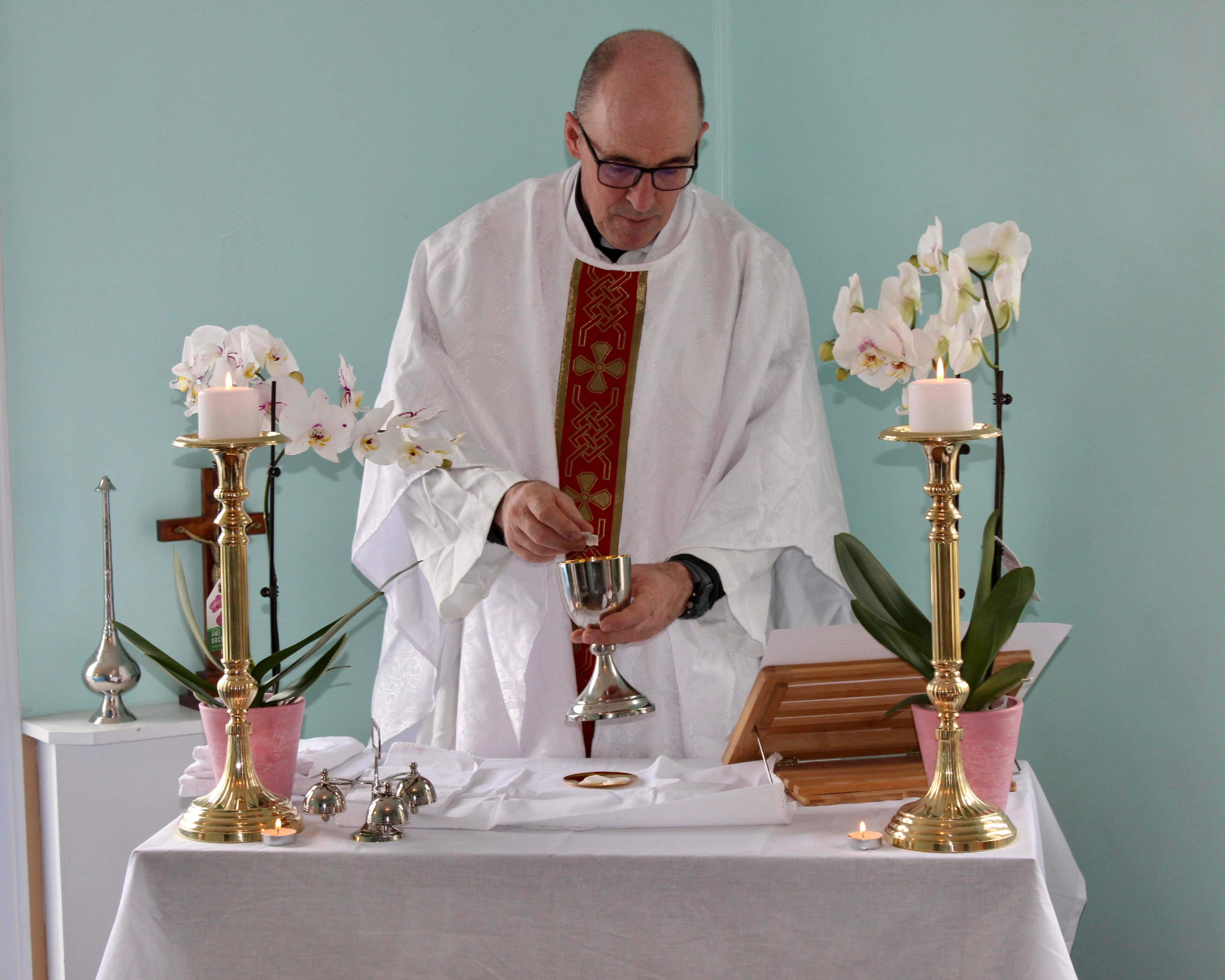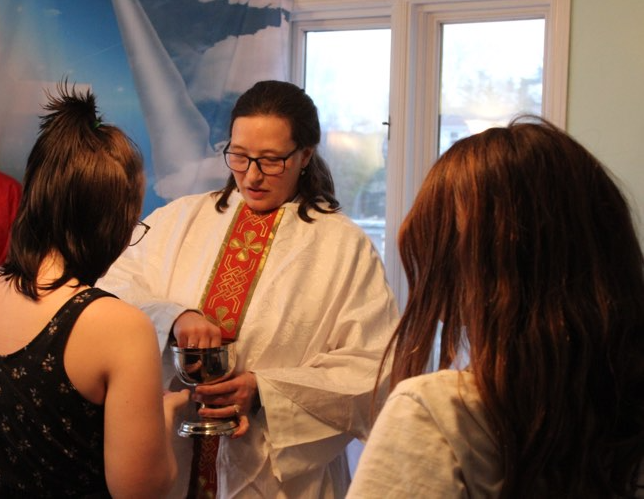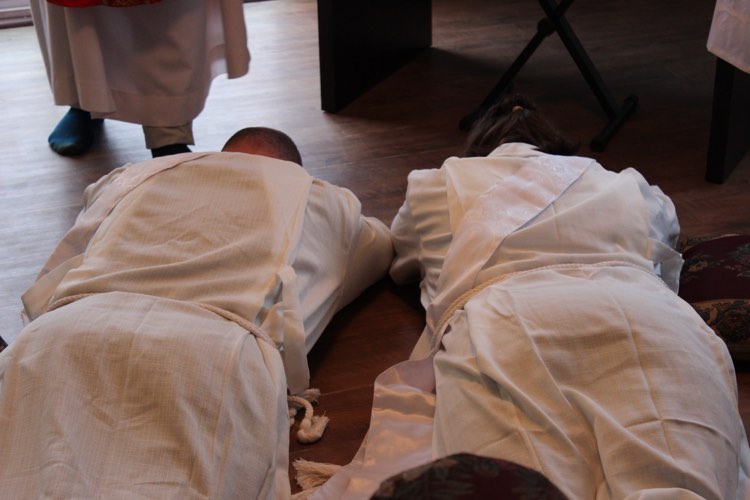- Home
- Seminary Studies
- Self Care for Clergy
Simply Catholic and Welcoming You
Self Care for Clergy

Fr. Bradley saying Mass
Self Care for clergy is crucial as clergy, like all care providers, are at high risk for burnout and compassion fatigue. Making self-care crucial for preventing these issues and maintaining their well-being, physically, mentally, emotionally, and spiritually.
Self-care includes taking stock of your own needs, goals, health, and accomplishments; taking time to nourish and nurture all of who you are. Imagine your self-care in four key dimensions of well-being: mind (mental/psychological), body (physical), heart (emotional), and spirit (spiritual/essence).
In all there are 8 main areas of self-care: physical, psychological, emotional, social, professional, environmental, spiritual, and financial.
Orem identified three types of self-care requisites, or requirements, for action: universal, developmental, and health deviation. Universal self-care requisites are those of all human beings throughout all stages of the life cycle, and can be adjusted for age, environment, and other factors. (Dorothea Orem in her Self Care Deficit Theory)

Fr. Philip and Amma Charlene Bradley;
Both Priests In St. Brigit's Community Catholic Church
Self Care for Clergy: Why is it so Crucial?
Why is Self-Care for clergy so Crucial?
High-Stress Environment:
Clergy often face demanding workloads, emotional challenges, and the constant need to be available for others, leading to stress and burnout.
Compassion Fatigue:
Constantly caring for others can lead to emotional exhaustion and a decline in their ability to provide effective care.
Preventing Burnout:
Neglecting self-care can lead to burnout, which can negatively impact their ministry, relationships, and overall well-being.
Modeling Healthy Boundaries:
Clergy who prioritize self-care can model healthy boundaries and self-care practices for their congregations, fostering a culture of well-being.

Amma Charlene Distributes the Holy Eucharist
Self Care for Clergy: Practical Tips
Prioritize Physical Health:
Exercise Regularly: Aim for at least 30 minutes of physical activity most days of the week. Yet more than half of clergy say they find consistently exercising (59%) and avoiding over-commitment and overwork (55%) to be challenging in their ministry.
Eat a Balanced Diet: Focus on nutritious meals and stay hydrated.
Get Enough Sleep: Aim for 7-9 hours of quality sleep per night.
Nourish Emotional Well-being:
Practice Mindfulness and Relaxation: Incorporate activities like meditation, deep breathing, or yoga into your routine.
Engage in Hobbies and Interests: Make time for activities that bring you joy and relaxation.
Seek Support: Connect with friends, family, or a therapist to process emotions and challenges.
Foster Spiritual Growth:
Spend Time in Prayer and Meditation: Connect with your faith and find peace and strength.
Engage in Spiritual Practices: Attend church services, participate in Bible studies, or engage in other spiritual activities.
Seek Spiritual Guidance: Talk to a trusted mentor or spiritual advisor.
Set Boundaries:
Learn to Say No: Don't over commit yourself and learn to prioritize your time and energy.
Schedule Downtime: Make time for rest and relaxation each week.
Take Vacations: Step away from work and recharge your batteries.
Stay Connected:
Maintain Relationships: Spend time with loved ones and nurture your social connections.
Connect with Other Clergy: Share experiences and challenges with colleagues.
Practice Gratitude:
Focus on the Positive: Acknowledge the good things in your life and practice gratitude.
Reflect on Your Blessings: Take time to appreciate the gifts and opportunities you have.
Each method of self-care fits into one of the 'seven pillars': mental, emotional, physical, environmental, spiritual, recreational, and social.
The Rules for Self-Care;
1) Your “Self” is Bigger Than You
2) Self-Care is Inclusive
3) Self-care is Not Self-Indulgence
4) Self-Care is Difficult and Worth the Work
5) Self-Care is Not a One-Size Fits All approach, it's about finding what works best for you and making it a regular part of your routine.
6) The 5 C's of mental health are Connection, Compassion, Coping, Community, and Care—provide a comprehensive framework for fostering mental well-being.
Remember
Self-care is a lifestyle
Self-care is not static
Self-care sometimes involves elimination
Don't compare your self-care to that of others

A Simple Altar
Self Care for Clergy: The Struggles
Why do clergy struggle with self-care?
Our minds play a significant role in our struggle with self-care. Sometimes, we subconsciously view self-care as a luxury or a sign of selfishness, especially when we are conditioned to prioritize the needs of others. This mindset can lead to feeling guilty about taking time for ourselves.
What are the symptoms of clergy burnout?
Emotional burnout in ministry is characterized by extreme fatigue, insomnia, frequent illness, decreased focus, and other debilitating symptoms resulting from prolonged stress and overwork. Some causes are chronic stress, insufficient sleep, poor nutrition, overworking, and a lack of physical self-care.
What should we avoid in self-care?
Over committing. One of the biggest self-care mistakes is over committing to too many tasks, projects, or activities.
Neglecting your basic needs
Ignoring your emotions
Comparing yourself to others
Forgetting to have fun
Belief that church/mission/parishioners come first and you get leftovers
Family/coworkers/others demand more and care less for you
Busy with life, family, career, church no time, to-do list
Difficulty in saying no
What is lack of self-care a symptom of?
In general, poor self-care represents a failure to prioritize one's own physical and mental health. This can lead to feelings of exhaustion, irritability, and depression. It can also make it difficult to focus on work or personal relationships.

Clergy maintaining their routines of Daily Mass, Divine Office and other Daily Devotionals are already well on their way to Self Care
Self Care for Clergy: Positive Practices and Final Notes
How to Practice Self-Care (Even When You Seem to Have No Motivation)
Find What Works for You. Self-care looks different for everyone.
Focus on Discipline
Schedule Self-Care
Visualize How You Will Feel After
Connect Self-Care With Other Tasks
Seeking Therapy When You Have No Motivation
What most often causes depression in clergy?
Loss and grief: Many clergy walk alongside people in their church who are facing unimaginable grief, from the loss of a partner to the loss of a child. Constant exposure to these dark realities can make clergy more likely to develop depression.
What does God say about major depression?
God encourages us to "call upon [Him] in the day of trouble; I will deliver you" (Psalm 50:15). Hopelessness is one of the hallmark symptoms of depression. "The grace of God in Jesus Christ is the sum of all hope" (Colossians 1:5-6, 23, 27; 1 Timothy 1:1).
Finally borrowing from my Celtic heritage and personal experience; Get to know and appreciate the Divine through nature. Take barefoot walks in nature. Take time to be absorbed in the wonder of Creation. Meditate and pray in the wild places.
Shower in a waterfall. Wade in the ocean. Lay back in the grass and watch the sky. Be a child again in the wonder of it all.
When you reach a point of meditative calm you may be surprised to find all manner of wild things showing no fear of you, even approaching you in their curiosity. Regardless of you having this particular experience or not, you should feel refreshed. Your appreciation for God and Creation renewed.
Most importantly, make a habit of taking five good deep full breaths any time you feel stressed or depleted. In your nose for five seconds and out your mouth for five seconds.
Remember you were called to do this because it is you who can do it. Be You. Do You. You will be the best at your ministry when you take care to be your best You!
Recent Articles
-
Catholic-Confession
Apr 19, 25 08:53 PM
Full breakdown of the Catholic Confession Sacrament of Reconciliation -
Ordination, incardination and dismissal of clergy
Mar 03, 25 06:47 PM
Overview of Ordination to Holy Orders, incardination and dismissal of clergy -
Catholic Last Rites
Mar 03, 25 06:41 PM
An explanation of the Catholic Last Rites and Anointing of the Sick


